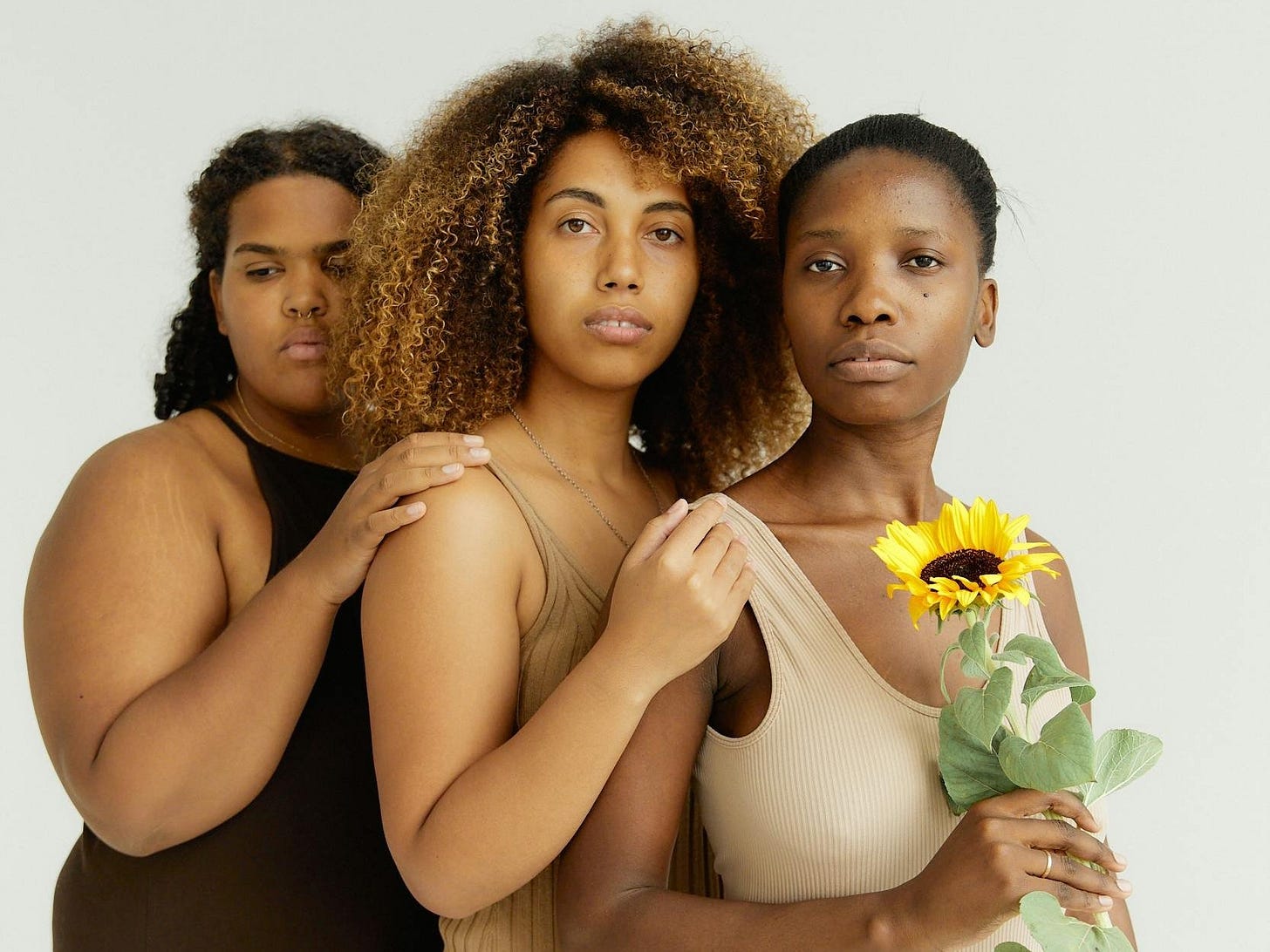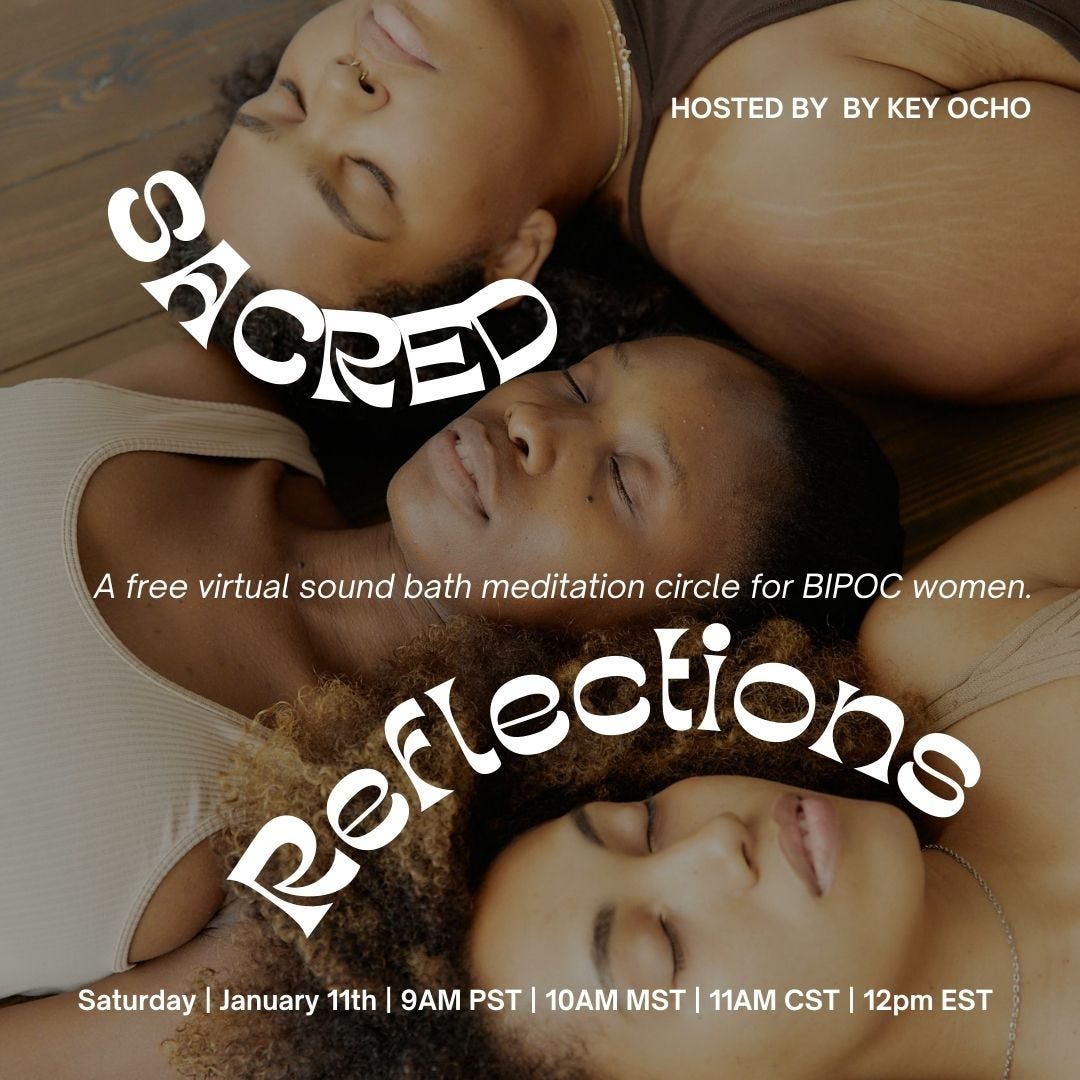Sacred Reflections: Meditation as an Act of Radical Self-Care
As a representative of the female BIPOC community, we are tired of carrying the weight of the world.
Between navigating workplace microaggressions, cultural expectations, and systemic challenges, our mental health often takes a backseat. What if I told you meditation isn't just another wellness trend but a powerful tool for reclaiming our mental space? Meditation saved my life.
In 2017, I was trapped in a corporate cubicle, slowly extinguishing my spirit. Driving into the parking lot each morning felt like entering a personal prison. The mere sound of a ringing phone or a new email would trigger overwhelming anxiety—uncertain what fresh wave of stress awaited me.
I was utterly burnt out between relentless performance metrics, exhausting office politics, and trying to chase my dreams after hours while making time for friends, family, and my partner. I didn’t realize it then, but my internal roots—those foundational parts of myself—were fragile and untended. To flourish, I needed to identify what areas of my roots needed tending and find the support necessary to nurture them into something strong and beautiful.
My parents had always encouraged mindfulness and meditation, but I tuned them out as a teenager. It wasn’t until years later, sitting on my therapist's couch, that the lesson hit home. I vividly remember breaking down, trembling as I told her how utterly exhausted I was and how my workplace felt like a constant trigger.

She helped me uncover the deeper issue: unprocessed childhood trauma, the weight of economic inequality, the pervasive impacts of racial and gender biases, and the daily toll of microaggressions. Despite trying countless healing modalities, none had a lasting impact because I wasn’t engaging in consistent, daily practice. Healing, she explained, isn’t a quick fix—it’s a continuous, intentional process. Without this foundation, my dysregulation showed up in every part of my life: at work, in challenging conversations, through insomnia, and in debilitating panic attacks.
She helped me build my toolbox—a set of practices to support my mental and emotional foundation. One of the first tools she introduced was the five senses meditation:
One thing I could see
One thing I could smell
One thing I could taste
One thing I could touch
One thing I could hear
We practiced it together, and as I closed my eyes, I traveled to my happy place: Miyajima Island off the coast of Hiroshima. I visualized the iconic Tori Gate standing majestically in the water. I could smell the earthy aroma of rain and the sweetness of Japanese steamed buns cooking nearby. I imagined the warm taste of a bao bun, the soft fur of the deer roaming the island beneath my fingers, and the gentle rhythm of waves lapping at the shore.
My heart rate slowed, and a deep calm washed over me. It felt as though I’d stepped out of the flames of anxiety into the cool embrace of peace.
I always pictured my awakening in a serene, exotic retreat in Bali. Instead, it unfolded in my therapist's office, with a box of tissues in one hand and a pillow tucked under my arm as I sat on her couch.
After our first session, she made me promise to revisit this practice each time I felt dysregulated. I did, and it became the key to making life-altering decisions, like leaving my toxic job. Over time, as I grew more experienced with meditation, I embraced advanced techniques, pairing them with journaling and movement. Years later, this journey led me to guide meditations for hundreds of students—many of them burnt-out women of color navigating the same struggles I once faced.
Let me share some statistics with you (this is just a glimpse and not an all-inclusive list):
BIPOC women experience significantly higher chronic stress levels compared to other groups. A 2022 survey by the American Psychological Association found that 68% of Black women feel overwhelmed by daily pressures, with workplace stress and racial trauma being key contributors. Additionally, microaggressions—small, frequent insults—heighten emotional exhaustion, particularly for Black and Latina women.
Immigrant BIPOC populations, predominantly Latino and Asian Americans, face unique stressors, such as acculturation challenges, language barriers, and fears of deportation or discrimination. A study by the APA showed that 65% of Latino immigrants report high-stress levels related to these factors. Similarly, Indigenous communities experience ongoing intergenerational trauma, contributing to higher rates of PTSD and chronic stress.
The COVID-19 pandemic has also exacerbated stress within BIPOC communities. According to the CDC, Hispanic and Black individuals have faced higher rates of illness and death, leading to increased stress. A 2020 APA survey found that 63% of Black Americans and 59% of Hispanic Americans reported elevated stress due to the pandemic’s disproportionate impact.
Regular doctor visits and the stark statistics served as wake-up calls, reminding me that prioritizing my well-being is not just an option but a responsibility. They prompted me to take ownership of my health and recognize when to seek support. These personal experiences and what I’ve learned from these statistics have deeply influenced my journey as a meditation, sound healer, and Chiron guide.
Through my work with BIPOC women, I’ve come to understand a common thread: they desire to be seen, heard and understood. They crave spaces for connection, shared experiences, and community that fosters healing and empowerment.
Women of color need:
Opportunities to meditate and reset their mental space.
Environments where they can breathe and find reprieve from daily pressures.
Safe, supportive communities.
Comprehensive mental health support.
Equity and justice in their personal and professional lives.
Creating these spaces and tools for healing is not just about well-being—it's about empowerment and liberation.
If you identify as a woman of the BIPOC community, I warmly invite you to join me for Sacred Reflections, a free, intimate online meditation space (via Zoom) dedicated exclusively to BIPOC women. On Saturday, January 11th at 10 am MST, we'll come together for an hour of:
A guided sound bath meditation
Deep reflection
Time for journaling
Community connection
Click the button below to register, and if you don’t identify as a woman of color, please send it to someone you know.
Donations are appreciated, though not required. Your presence is the only investment I ask for. Due to the intimate nature of this event, space is limited.






Mmmm I resonate with so much of this. As a British-born Jamaican, I learned to prioritise rest and resist the cultural tendency to overachieve, overwork, and assimilate into spaces that enjoy my exhaustion and discomfort. I really appreciate your work and this opportunity to get into the habit of being seen easeful, regularly. I can't wait to attend on 1/11 - the workshop sounds incredible. Thanks for the offering, I'm also a new subscriber ❤️